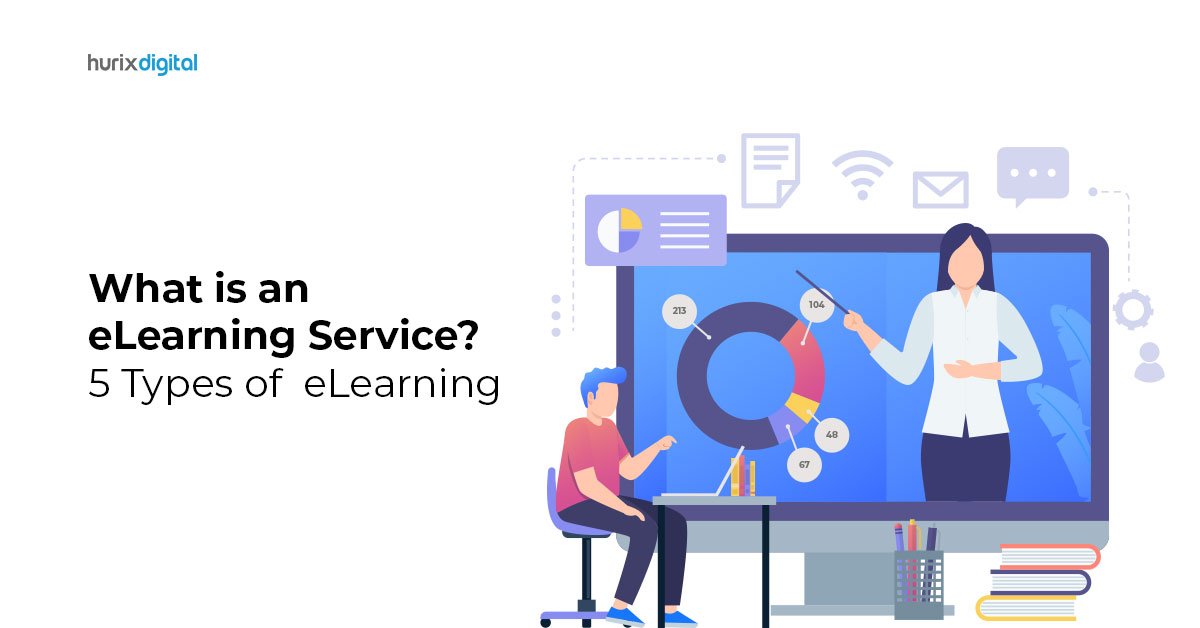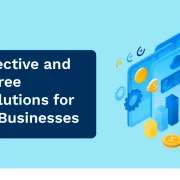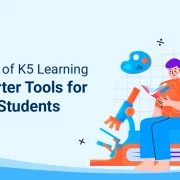
What is an eLearning Service? 5 Types of eLearning
Summary
This blog discusses the evolution of the eLearning industry over the years and the five types of e-Learning services.
In this digital era, education has taken on a new dimension, allowing people from all walks of life to access knowledge and enhance their skills conveniently and flexibly. eLearning, short for electronic learning, has emerged as a game-changer, revolutionizing how we learn and acquire information.
So, what exactly is an eLearning service? Put simply, it refers to the delivery of educational content and training through electronic devices such as computers, tablets, or smartphones, using the power of the internet.
In today’s blog, we will delve into the concept of eLearning services and discuss five different types of eLearning services that have revolutionized how we learn.
Table of Contents:
- How has the eLearning Services Industry Evolved Over the Years?
- What are the 5 Types of eLearning?
- What are the Benefits of eLearning Services?
- Final Thoughts
How has the eLearning Services Industry Evolved Over the Years?
The eLearning market has witnessed substantial growth globally, driven by technological advancements and increasing demand for flexible and accessible education. The COVID-19 pandemic has further accelerated the adoption of eLearning, with many educational institutions and organizations shifting to online platforms to ensure continuity of learning.
According to a report by Global Market Insights, the global eLearning services market size was valued at over $399 billion in 2022 and is projected to surpass $1 trillion by 2032, growing at a compound annual growth rate (CAGR) of over 14% during the forecast period.
Similarly, the eLearning industry has become a go-to solution for corporate training and professional development programs. A study by Technavio predicts that the corporate eLearning market will grow by $44,908 billion during 2022-2027 at a CAGR of over 12%.
Organizations are finally recognizing the cost-effectiveness, scalability, and convenience of eLearning platforms. Thus, these statistics highlight the remarkable growth and evolution of the eLearning industry.
The field of eLearning offers a diverse range of services that cater to different learning needs and preferences. This section will explore five types of eLearning services that have transformed the way we acquire knowledge and skills.
Also Read: Online Assessment: The Future of E-Learning
What are the 5 Types of eLearning?
1. Online Courses
Online courses are at the forefront of eLearning services, providing learners with access to a wide array of subjects and topics. These courses are typically delivered through learning management systems (LMS) and feature structured content, multimedia resources, quizzes, and assessments.
As per GlobeNewswire, the global LMS market is projected to reach $29.35 billion by 2026, with a CAGR of 16.8% from 2021 to 2026. This underscores the increasing demand for online courses and the technology that supports them.
2. Virtual Classroom and Webinars
Virtual classrooms and webinars bring the live learning experience into the digital realm. Through web conferencing tools, learners can participate in real-time lectures, discussions, and interactive sessions.
These platforms often feature chat functionalities, breakout rooms for group activities, and the ability to share presentations and documents. Virtual classrooms and webinars enable remote learning and foster participant engagement and collaboration.
3. Mobile Learning (m-Learning)
With the proliferation of smartphones and tablets, mobile learning has gained immense popularity. M-Learning services deliver educational content optimized for mobile devices, allowing learners to access materials on the go. The on-the-go nature of learning drives this shift, as learners can access educational content anytime, anywhere.
Mobile apps and responsive websites also offer bite-sized lessons, videos, interactive quizzes, and gamified learning experiences. mLearning provides flexibility and convenience, enabling learners to fit learning into their busy schedules.
4. Microlearning
Microlearning breaks down complex topics into bite-sized, focused learning units. These short modules are designed to deliver specific learning objectives or address particular skills.
Microlearning typically utilizes multimedia formats such as videos, infographics, or interactive simulations to provide concise and engaging content. This approach is ideal for just-in-time learning, knowledge reinforcement, and quick skill acquisition.
5. Gamified Learning
Gamified learning services incorporate game elements and mechanics into the learning process. By introducing gamification attributes such as challenges, rewards, competition, and progress tracking, gamification enhances learner engagement and motivation.
Gamified platforms often feature leaderboards, badges, and levels to stimulate learner participation and create an immersive learning experience. This approach is particularly effective for skills development, knowledge retention, and creating a fun and interactive learning environment.
Also Read: E-Learning in Higher Education: Understanding its Impact on Students and Educators
WHITEPAPER:
Maximizing the ROI & Business Impact of Enterprise Learning
What are the Benefits of eLearning Services?
eLearning services have transformed the educational landscape, offering numerous benefits for learners and organizations alike. In this section, we will explore the benefits of eLearning and highlight the key reasons to choose eLearning solutions:
1. Flexibility and Accessibility
E-learning provides unparalleled flexibility and accessibility to learners. With eLearning, individuals can access educational content anytime, anywhere, eliminating time and location constraints.
Learners have the freedom to set their own pace, allowing them to balance their education with other commitments. This accessibility is particularly valuable for professionals seeking to upskill or students juggling multiple responsibilities.
2. Customization and Personalization
One of the standout benefits of eLearning services is custom eLearning solutions, which can tailor the learning experience to individual needs. eLearning companies offer custom eLearning services that allow organizations to develop training programs aligned with their specific goals and requirements. Learners can engage with content relevant to their roles, ensuring maximum relevance and engagement.
3. Cost-Effectiveness
eLearning is often a cost-effective alternative to traditional classroom-based learning. With eLearning, there are no expenses associated with physical facilities, travel, or printed materials. eLearning solutions enable organizations to save costs on training programs, while individuals can access affordable courses without the overheads typically associated with in-person education.
4. Scalability and Consistency
eLearning services offer scalability, allowing organizations to train many learners simultaneously across a range of topics. eLearning companies specialize in creating scalable solutions that can accommodate diverse learner populations. Moreover, eLearning ensures consistency in content delivery, ensuring that every learner receives the same high-quality information and learning experience.
5. Localization and Translation
For global organizations or those operating in multilingual environments, eLearning localization, and translation services are crucial. eLearning localization services adapt courses to specific cultural contexts, ensuring that content is culturally appropriate and resonates with learners worldwide. eLearning translation services facilitate the translation of courses into multiple languages, enabling learners to access content in their native languages.
These eLearning services enhance learner engagement and improve learning outcomes by removing language barriers. By partnering with eLearning companies offering these services, organizations can effectively reach and educate a diverse global audience.
Final Thoughts
The five types of eLearning services offer a glimpse into the diverse approaches to digital education. Each type caters to different learning preferences, objectives, and contexts. Whether you prefer self-paced online courses, interactive virtual classrooms, on-the-go mobile learning, focused microlearning modules, or gamified experiences, eLearning services provide a wealth of opportunities to acquire knowledge and skills.
With our expertise in custom eLearning services, eLearning localization services, and eLearning translation services, Hurix Digital is your go-to partner for all your digital education needs. If you’re an organization seeking to provide effective training programs, Hurix Digital offers innovative and tailored eLearning solutions that deliver results.
Contact us today to know more!

A highly enthusiastic and motivated sales professional with over twenty five years of experience in solution selling of training-related applications and services. Maintains an assertive and dynamic style that generates results. Ability to establish long-term relationships with clients built on trust, quality of service and strategic vision. Specializes in financial services, higher ed, publishing and government in the areas of learning and development.




